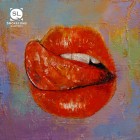I love the assortment of items that the narrator unearths. How did you decide upon these particular objects?
I chose items that varied in permeability—paper, fish, tooth, horseshoe; items related to a variety of aspects of life—work, kids, pets, home; things that would create a timeline, though out of order—college, having kids (and leaving work), the kids growing up. I chose some tangible things—a tooth, pets—and some intangible things, hopes and dreams. The things she was wishing or hoping were things that she never had to begin with, but things for which she might feel a loss anyhow.
The matter-of-fact way that the narrator acknowledges these items feels just right for the story. We may be struck by the novelty, but she isn’t. Did that tone come naturally?
A matter-of-fact tone and a lack of astonishment are common elements in literature of—not just the fantastic—but the incredible. In “The Metamorphosis,” Gregor Samsa is too worried about going to work to care about having turned into an insect. In Denis Johnson’s “Emergency,” Georgie, on drugs, is upset about blood on the floor because it makes him think of the “goop” inside him that “wants to get out,” not because there couldn’t actually be as much blood on the floor as he sees. The insane woman in “The Yellow Wallpaper” doesn’t question the figure “skulk[ing] about” behind the wallpaper. And before any of that, it was the language of fairy tales. No one in a fairy tale is surprised by talking beasts, transformations, tables that produce hot dinners or hair that is long and strong enough to double as a rope ladder, except to be surprised by their great luck or misfortune. So the tone is something I imitated.
What objects from your past would you find the most and least surprising to find in your drain?
Finding pretty much anything in my drain other than hair, muck, food, would be surprising. My ring, at least, I’m pretty sure went down there, so that would probably be the least surprising surprise, and perhaps the happiest, partly because I want it and partly because finding it there wouldn’t be impossible and scary. The most surprising might be an old friend, or someone I only met once, a summer camp counselor, my third grade teacher—any human.
How does this story resemble (or not) other pieces you’ve written or are writing? And what are you working on now?
I like metaphor, women, stories focused on ideas, shorter fiction, and things that are just off real—magical realism, surrealism, some Gothic fiction—so those are things I come back to. I am currently going through a pile of drafts, throwing away a lot, and slowly revising a few.
Has the story given you any new insight into how to handle the failed ambitions or visions for our lives—or just the passage of time?
In real life, on the windowsill behind my kitchen sink, there are various small objects so I have something pretty to look at while I’m doing the dishes. There is a hair ornament purchased on my honeymoon in Thailand and some small metal sculptures my husband made in college. Not all the things have some strong personal significance; some are just nice to look at. There is a wooden bracelet I got at a thrift shop, a big pink agate the light shines through and a butterfly that just happened to die there. The point is that while it wouldn’t do to live in denial, we shouldn’t spend too much time staring down the drain. Look up and look forward and out. Look at the beauty in front of your face. Look at the inscrutable horizon. Look at the suffering that isn’t yours, and look for ways to help.



 The SmokeLong Grand Micro Contest (The Mikey) is now an annual competition celebrating and compensating the best micro fiction and nonfiction online.
The SmokeLong Grand Micro Contest (The Mikey) is now an annual competition celebrating and compensating the best micro fiction and nonfiction online.